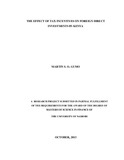| dc.description.abstract | FDI creates employment and acts as a vehicle of technology transfer, provides superior skills and management techniques, facilitates local firm’s access to international markets and increases product diversity. Most countries strive to attract FDI because of its acknowledged advantages as a tool of economic development. The study sought to establish the effect of tax incentives on Foreign Direct Investments in Kenya.
The study was descriptive and adopted a descriptive research design which was used to give the researcher a comprehensive picture of the variable relationship since the method is the only means of accurately measuring and giving statistical inferences. The data was collected from secondary data (tax incentives and Foreign Direct Investment) sources collected from Kenya Revenue Authority (KRA), Treasury and Kenya National Bureau of Statistics (KNBS). Descriptive statistics, correlation and multiple linear regression models were used in data analysis.
The study established that Kenya has various tax incentives including capital investment allowances offered to resident companies such as Industrial Building Allowance (IBA) granted on capital expenditure incurred on the construction of an industrial building, investment deduction granted to encourage development in manufacturing industries, farm works deduction granted at the rate of 50 % per annum for two years, Shipping Investment Deduction granted at the rate of 40% on capital expenditure, and mining allowance which is granted to a person who incurs capital expenditure on searching for, discovery, testing and winning access to minerals; expenses incurred in obtaining acquisition rights over deposits; expenses related to purchase of machinery and buildings together with the development, general administration and management prior to commencement of production. This is granted at the rate of 40% in the first year and 10% from the second to the seventh year. It was established that on investment incentives, investment deduction (p = .047) and mining operation deduction (p = .038) have positive effect on FDI, while industrial allowance (p = .054) has a negative effect. On trade related incentives, export processing zones (p = .008) and tax remissions export office (p = .009) had positive effect on FDI while manufacture under bond (p = .004), as an incentive, had negative effect on FDI. The study concludes that tax incentive would have a positive resultant effect on FDI and recommends that Government need to evaluate its tax incentives policy, and weigh against the benefits that accrue with the intention of spurring investment including introducing evidence based tax incentives that would minimize tax evasion. | en |

